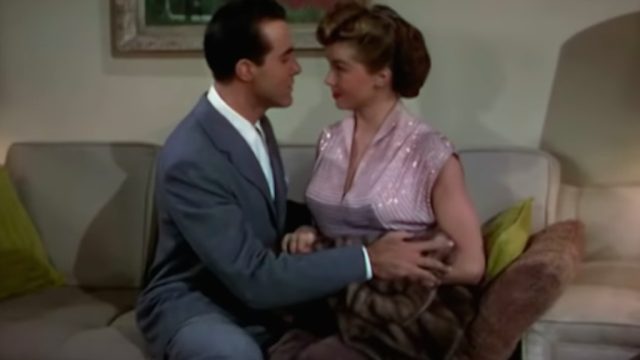Why Radio Stations Across America Are Banning This Famous Christmas Song

In a move that feels like a long time coming, several radio stations across America have chosen to stop playing the classic Christmas hit “Baby, It’s Cold Outside.” Last week, Cleveland station WDOK decided to pull the song after a listener called in to complain about the lyrics, despite the fact that a Facebook poll showed that 92 percent of the station’s listeners favored the song while only 8 percent deemed it inappropriate.
Since then, San Francisco-based station 96.5 KOIT announced that they had also decided to remove the song following complaints, but are considering bringing it back due to a large outcry from listeners demanding it be reinstated. KOSI 101 in Denver are in a similar position, and it’s clear that there are two very different—and equally passionate—camps when it comes to this popular tune.
The 1944 song, written by Frank Loesser, is about a man trying to get a woman to stay over his house during a snowstorm, and features several undertones that we’d now consider predatory and lyrics that are viewed as problematic. The worst one, perhaps, is when the woman responds to his dogged attempts to seduce her with, “Say, what’s in this drink?,” which is definitely a line that doesn’t land well in a time when rape culture is at the forefront of national conversation.
WDOK midday host Desiray echoed the sentiment of many people who advocate banning the song when he told Fox News, “People might say, ‘oh, enough with that #MeToo,’ but if you really put that aside and listen to the lyrics, it’s not something I would want my daughter to be in that kind of a situation. The tune might be catchy, but let’s maybe not promote that sort of an idea.”
Cleveland Rape Crisis Center President and CEO Sondra Miller agreed, saying, “[The song] really pushed the line of consent. The character in the song is saying ‘no,’ and they’re saying well, ‘does no really mean yes?’ And I think in 2018 what we know is consent is ‘yes’ and if you get a ‘no,’ it means ‘no’ and you should stop right there.”
But there are also a lot of people who think this is an example of good intentions taken to the extreme. Recently, American singer Toni Braxton said that she doesn’t consider the song offensive because the woman in it “chose to stay.”
She concedes that the one part of the song that’s a bit of an eyebrow-raiser is when the female lead makes an allusion to possibly being roofied, but, otherwise, the woman makes it clear that she “stayed because she wanted to stay.”
“I think [the people that are taking it off the air] are taking it a little bit too far,” she added. “It was a great song.”
Chriss Willman of Variety also wrote that “it’s time to end the war” on the song, arguing that it was “actually a witty, ahead-of-its-time avowal of women owning their own sexual agency.”
For what it’s worth, I think that there’s a good case to be made there, given that the majority of the lyrics indicate that the woman is trying to leave not because she wants to, but because it was socially unacceptable in the 1940s for an unmarried woman to spend the night in another man’s home, regardless of the weather.
She tells him that “This evening has been/So nice and warm,” and that she wishes she knew how to break the spell he had over her, indicating her attraction. She says she “ought” to say no. The only reason her “answer is no,” is because her “mother will start to worry,” “father will be pacing the floor, her “sister will be suspicious,” her “brother will be there at the door,” and her “maiden aunt’s mind is vicious,” and so on. To that extent, her decision to stay in spite of what “the neighbors might think” and the fact that “there’s bound to be talk tomorrow” can be interpreted as a feminist move. Instead of allowing others to police what she does with her body, she chooses to give in to her own desires and stay.
It’s worth noting that in many versions of the call-and-response song that exist since it was first released, the lead singer sounds coy and playful—not bullied and uncomfortable. Are we taking this song just a little bit too seriously? Your call. And for some things that are totally outdated that you should 100 percent avoid at all costs, see these 20 Subtly Sexist Things People Still Say at Work.
To discover more amazing secrets about living your best life, click here to follow us on Instagram!